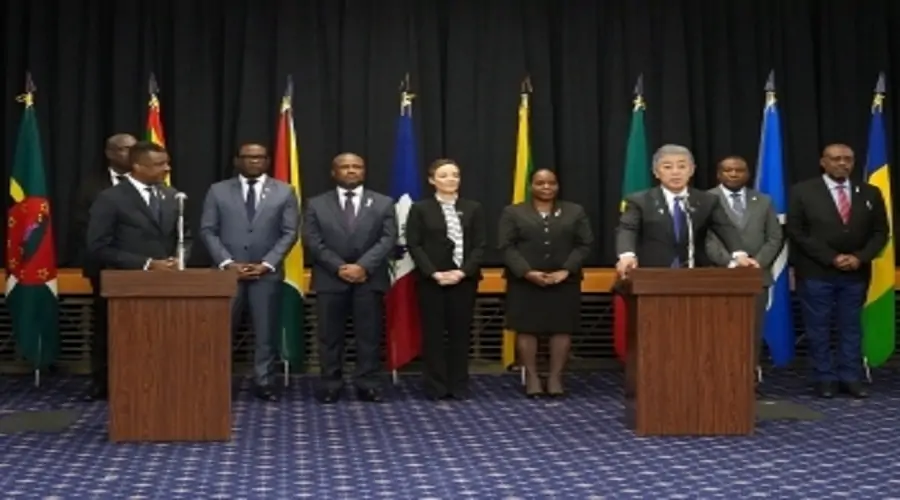On December 14, commencing at 9:30 a.m., Mr. IWAYA Takeshi, Minister for Foreign Affairs of Japan, held and co-chaired the Eighth Japan-CARICOM Ministerial-Level Conference (approx. 3 hours) and working lunch (approx. 1 hour 30 minutes) with the foreign ministers and other high-level officials from 14 member states that comprise the Caribbean Community (CARICOM) who are currently visiting Japan. The overview is as follows.
Following the conference, the participating countries adopted the Ministerial Joint Statement between Japan and CARICOM as an outcome document.
(1) Japan-CARICOM Relations
a) Overview
Minister Iwaya expressed his determination that Japan and CARICOM countries, as nations that share values and principles, will cooperate under the three pillars of Japan’s CARICOM policy to address worldwide issues, including challenges to a free and open international order based on the rule of law and increasingly serious global challenges such as climate change.
b) Cooperation towards sustainable development, including overcoming the vulnerabilities particular to small island states
Minister Iwaya stated that Japan has been providing support across various fields, including disaster risk reduction, maritime issues, and fisheries and aquaculture industries, to help overcome the vulnerabilities of CARICOM countries since 2014, and expressed Japan’s intention to continue to build up new cooperation under its “Diplomatic Initiative toward Latin America and the Caribbean” in fields such as maritime issues, disaster risk reduction, climate change, and human security.
In response, the CARICOM member states expressed their appreciation for the strengthening of the relationship between Japan and CARICOM, and the broad array of assistance being extended by Japan, along with stating that the holding of this Ministerial-Level Conference in Tokyo for the first time in ten years demonstrates both sides’ strong interest in strengthening cooperation.
c) Expanding and Deepening bonds of exchange and friendship
Both sides appreciated the progress made through exchanges during the Japan-CARICOM Friendship Year 2024 , and expressed expectations for further strengthening mutual understanding and friendly relations between Japan and CARICOM through exchanges at various levels, including mutual visits by government officials, the promotion of exchanges between members of parliament, and programs such as the “JET Program” and “Juntos!!”
(2) Cooperation in addressing challenges of the international arena
a) Overview
Both sides concurred that unilateral attempts to change the status quo by force or coercion constitute a challenge to the order, which is the common foundation of our peace and prosperity, and that no country can remain unaffected, making it necessary for Japan and CARICOM to work together and raise their voices in the international arena under the Global Partnership.
b) Nuclear disarmament and non-proliferation
Minister Iwaya expressed appreciation for CARICOM countries’ support to the draft resolution on the elimination of nuclear weapons submitted by Japan in the Plenary Meeting of the United Nations General Assembly. In addition, both sides concurred to continue their cooperation towards their common goal of achieving a world without nuclear weapons.
c) International organizations
Minister Iwaya expressed Japan’s desire to continue working closely with CARICOM to achieve reform of the UN Security Council on next year’s 80th anniversary of the UN. The CARICOM side stated that it also attaches importance to realizing Security Council reform, and both sides concurred to strengthen their coordination.
Minister Iwaya noted that Japan would like to explore Japan-CARICOM collaboration in the area of gender, including Women, Peace and Security called WPS, which is one of the key issues of the Diplomatic Initiative toward Latin America and the Caribbean.
d) Climate change
Minister Iwaya stated that Japan would continue to cooperate with CARICOM to overcome vulnerabilities particular to small island states in the fields such as the environment, including climate change, disaster risk reduction and maritime issues, and to achieve sustainable development.
The CARICOM member provided a detailed explanation of the severe impacts caused by rising sea levels and frequent natural disasters due to climate change, expressed appreciation for Japan’s profound understanding of these issues and cooperation to date, and confirmed their continued close cooperation.
e) Maritime issues
Minister Iwaya stated that the sustainable use of marine living resources is a common interest for Japan and CARICOM countries, and expressed Japan’s intention to continue working with CARICOM countries to promote the sustainable use of marine living resources through science-based resource management.
The CARICOM member states noted that they intend to cooperate on sustainable fisheries and the sustainable use of marine resources in general.
f) Regional affairs
Both sides exchanged views on the situations in East Asia as well as Latin America and the Caribbean and Ukraine. Regarding issues related to North Korea, the CARICOM member states expressed shared concerns and voiced support for the immediate resolution of the abductions issue.


